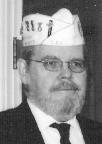 | Frank Bergquist graduated from Eddyville, IA, high school in 1958. After graduation, he entered the Army, serving 20 years in Missouri, Maryland, New Mexico, Germany, Iowa, Turkey, Kansas, S.E. Asia, and finally retiring in 1978 in Louisiana. Before retiring, Frank was assigned as an ROTC instructor at WSU and Kemper Military School until 1974. In 1978 he served as the Non-Commissioned officer in charge of operations at Fort Polk, LA. He has served as the Veterans Counselor (DVOP) with the Kansas Job Service Center National Service Office, with the Disabled American Veterans at the VA Regional Office in Wichita; Veterans Employment and Training Coordinator with the US Dept. of Labor at Ft. Riley, KS; Service Coordinator with Cerebral Palsy Research Foundation; Dept Adjutant-Treasurer and the Dept. Executive Director Dept. of Kansas Disabled American Veterans; and past President of the Wichita Civil War Round Table. Currently he is doing graduate work as an instructor in Genealogy and Military History at Wichita State and Kansas State Universities, and is the CEO for the Disabled American Veterans Thrift Stores in Wichita, KS. Bergquist has an AA from Kemper Military School and College from Boonville, MO. and a BGS from Wichita State University. He can be reached by telephone at 316-262-6501. He is located at 926 N. Mosley Wichita 67214. |
Veteran Affairs
2008-03-01 09:38:00
Learning from veterans
Question: What can we learn from our older veterans?
Answer: I attended a funeral the other day for a friend of mine. He was a World War II veteran. It was a sad occasion; he had died of cancer, so his suffering was finally over. His military career was interesting to me. He enlisted after high school. Actually “enlisted” was not the right word to use. It means voluntary, but he had received a draft notice after high school. He was full of stories as all old veterans are. Sometimes the stories are only told to other veteran’s. We tolerate each other stories, no matter how often we hear them. He took part in maneuvers in Louisiana as part of his military training. This was a major experience for him and the first time he had really been out of Kansas for a prolonged period of time. If I had a chance to change things about how his funeral was, I failed to wear my uniform. I got it out the night before. When I got dressed the next morning, I skipped the uniform and put my suit on instead. I have been retired from the US Army since 1978; that makes it thirty years I have been retired. I keep my uniform ready for occasions just like this veteran’s funeral. Usually I wear it for funerals, Memorial Day and Veteran’s Day. I truly regret not putting my uniform on that morning. This person was not just a veteran but a friend of mine. He had served his country. I don’t know all of his history. He spent time overseas in strange and interesting places. I can assume he met interesting people and did interesting things in both his military and civilian life. His service was in the artillery. One of the more interesting things he had done was to receive glider training prior to D Day in Europe. His unit was trained to be flown by glider from England to the mainland of Europe on D Day. For whatever reason this did not happen, which is fine for the death rate on these types of units was high. This veteran served from England through Germany. He had a leg injury during his service and also received an injury from a land mine. He did not receive a Purple Heart for his wound. It always bothered me that he didn’t, but we could never get the right paperwork to the right people. No one spoke about the veteran except the minister conducting the service and the VFW Honor Guard. The immediate family was grieving and in pain, at the loss of their loved one. I know that people came to the funeral because they genuinely wanted to be there. He lived an interesting life. He was a friend of mine. But that’s from another veteran’s standpoint. I don’t expect to go to a funeral and be entertained with a major production based on a person’s life.
As I have reached 68 years of age, I have been to a lot of funerals. None of us like to talk about death, but if you are an old veteran it is inevitable and getting close. So, share your experiences with those that will listen.
And if you have an older veteran in your family, seek them out and learn from them. Their history shouldn’t die with them. Their history should be passed down from generation to generation with pride and gratitude.


